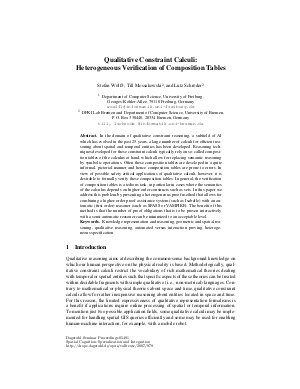Qualitative Constraint Calculi: Heterogeneous Verification of Composition Tables
Authors Stefan Wölfl, Till Mossakowski, Lutz Schröder
-
Part of:
Volume:
Dagstuhl Seminar Proceedings, Volume 5491
Part of: Series: Dagstuhl Seminar Proceedings (DagSemProc) - License:
 Creative Commons Attribution 4.0 International license
Creative Commons Attribution 4.0 International license
- Publication Date: 2007-04-25
File

PDF
DagSemProc.05491.9.pdf
- Filesize: 239 kB
- 12 pages
Document Identifiers
Subject Classification
Keywords
- Knowledge representation and reasoning
- geometric and spatial reasoning
- qualitative reasoning
- automated versus interaction proving
- heterogeneous
Metrics
- Access Statistics
-
Total Accesses (updated on a weekly basis)
0Document
0Metadata
Abstract
In the domain of qualitative constraint reasoning, a subfield of AI which has evolved in the past 25 years, a large number of calculi for efficient reasoning about spatial and temporal entities has been developed. Reasoning techniques developed for these constraint calculi typically rely on so-called composition tables of the calculus at hand, which allow for replacing semantic reasoning by symbolic operations. Often these composition tables are developed in a quite informal, pictorial manner and hence composition tables are prone to errors. In view of possible safety critical applications of qualitative calculi, however, it is desirable to formally verify these composition tables. In general, the verification of composition tables is a tedious task, in particular in cases where the semantics of the calculus depends on higher-order constructs such as sets. In this paper we address this problem by presenting a heterogeneous proof method that allows for combining a higher-order proof assistance system (such as Isabelle) with an automatic (first order) reasoner (such as SPASS or VAMPIRE). The benefit of this method is that the number of proof obligations that is to be proven interactively with a semi-automatic reasoner can be minimized to an acceptable level.
Cite As Get BibTex
Stefan Wölfl, Till Mossakowski, and Lutz Schröder. Qualitative Constraint Calculi: Heterogeneous Verification of Composition Tables. In Spatial Cognition: Specialization and Integration. Dagstuhl Seminar Proceedings, Volume 5491, pp. 1-12, Schloss Dagstuhl – Leibniz-Zentrum für Informatik (2007)
https://doi.org/10.4230/DagSemProc.05491.9
BibTex
@InProceedings{wolfl_et_al:DagSemProc.05491.9,
author = {W\"{o}lfl, Stefan and Mossakowski, Till and Schr\"{o}der, Lutz},
title = {{Qualitative Constraint Calculi: Heterogeneous Verification of Composition Tables}},
booktitle = {Spatial Cognition: Specialization and Integration},
pages = {1--12},
series = {Dagstuhl Seminar Proceedings (DagSemProc)},
ISSN = {1862-4405},
year = {2007},
volume = {5491},
editor = {Anthony G. Cohn and Christian Freksa and Bernhard Nebel},
publisher = {Schloss Dagstuhl -- Leibniz-Zentrum f{\"u}r Informatik},
address = {Dagstuhl, Germany},
URL = {https://drops.dagstuhl.de/entities/document/10.4230/DagSemProc.05491.9},
URN = {urn:nbn:de:0030-drops-9798},
doi = {10.4230/DagSemProc.05491.9},
annote = {Keywords: Knowledge representation and reasoning, geometric and spatial reasoning, qualitative reasoning, automated versus interaction proving, heterogeneous}
}
